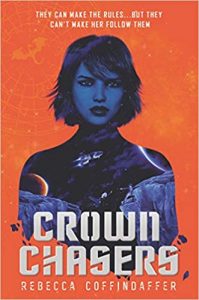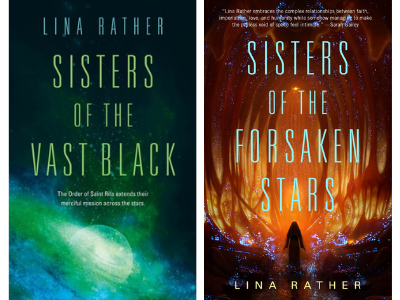Amazon Affiliate Link | Bookshop.org Affiliate Link
Crownchasers by Rebecca Coffindaffer is the story of Alyssa Farshot, a space pilot and member of the Explorers’ Society who wants nothing more than to take risks, break records, and scarf down a greasy hangover cure. Her life takes a sharp turn when the uncle who raised her dies—and did I mention he’s the emperor? Now heirs to the prime families, including Alyssa, must compete in a race across the stars to find the royal seal.
The winner will lead a thousand and one planets. The loser can return to riding flame tsunamis and eating bacon-egg-and-cheese hangover sandwiches.
Let the games… begin?
Alyssa could so easily have been unbearable—I rarely enjoy reluctant heroines—but, instead, she’s clever, resourceful, and immediately twists the situation to one in which she cares about the outcome. Rather than accepting her reluctance, she changes the game by allying herself with fellow contestant and best friend Coy. This speaks volumes to Alyssa’s character. It shows her to be someone who finds and takes third options rather than letting her circumstances be dictated. It also shows her to be a heroine who won’t be dragged along. The narrator cares. So the book stays interesting.
The plot is a straightforward fetch quest, layered with conniving politicians, planetary cultures and geographies, and well-rounded secondary characters. Planets range from dull to gorgeous, hostile to hostiler. Most species are humanoid, with variations like wings and horns, or crying not tears but drops of light. The story moves quickly with snappy, sometimes hilarious prose to match, and balances background with action. For me, this is where a lot of books fall flat—the worldbuilding feels like a textbook. While I don’t recall every detail from Crownchasers, I don’t think I’m missing anything important, because the feeling was more important than the precise circumstance. Things like how unfailingly rational secondary character Setter is, or the worlds that felt exploited by the empire, that remains with me even if I can’t quote direct passages.
In addition to being a solid great read, Crownchasers is very queer-normalized. Alyssa’s sexuality is never named, not as a secret, but as unimportant. Her attraction to multiple genders goes unremarked upon. Alyssa was raised by her uncles, while Setter has two moms. Queerness simply exists. More than that, relationships are portrayed in a healthy way. One thing that especially stood out to me was Alyssa and her ex-girlfriend, Faye, are both in the crownchase. They snark a bit, but no more than they do with anyone else, and although their breakup devastated Alyssa, it happened mutually and without either trying to hurt the other. They just realized they weren’t right together and ultimately remained friends.
I’ve read this book twice—once when it first came out, and again recently as I got my hands on the sequel. Both times I read it quickly, laughed, cried, and absolutely needed to know what happened next. It’s a fast-paced adventure with a engaging narration, that normalizes queerness and questions power structures, all centered around a protagonist who’s deeply flawed but just as deeply lovable.


